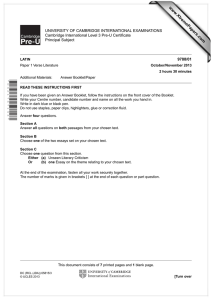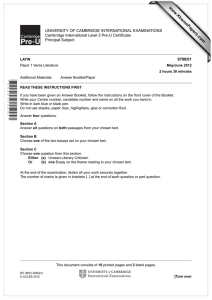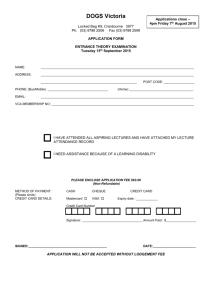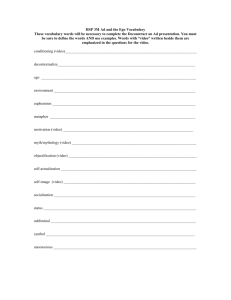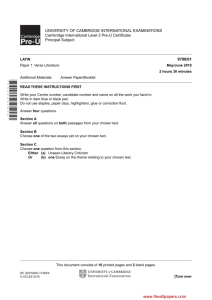www.XtremePapers.com
advertisement
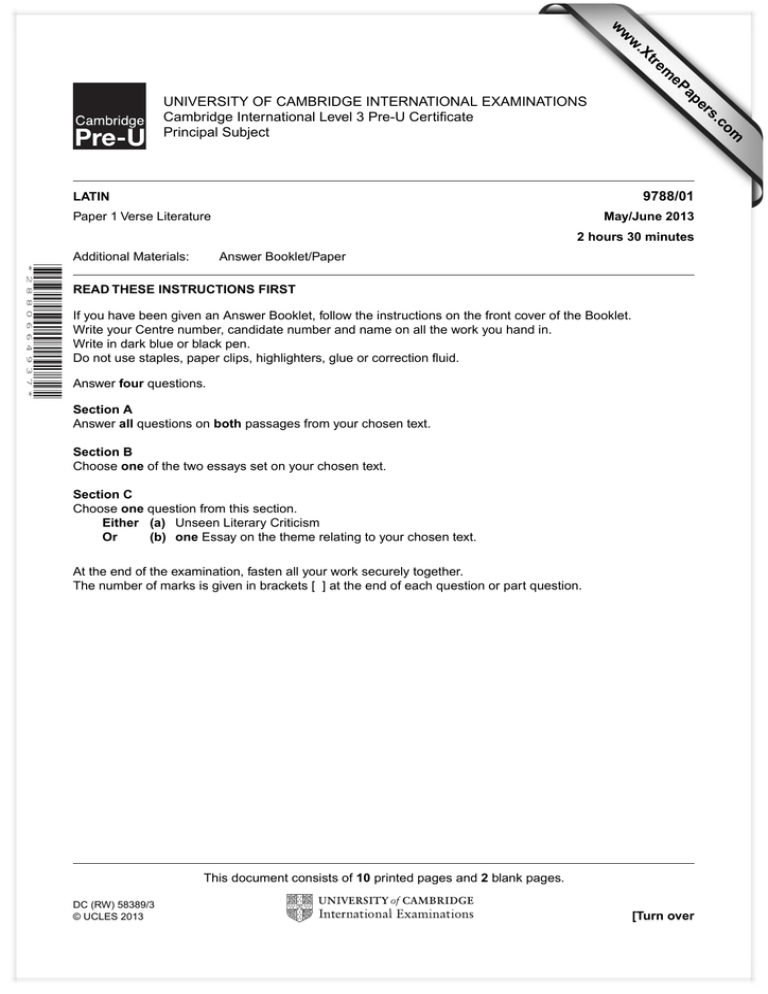
w w ap eP m e tr .X w om .c s er UNIVERSITY OF CAMBRIDGE INTERNATIONAL EXAMINATIONS Cambridge International Level 3 Pre-U Certificate Principal Subject 9788/01 LATIN Paper 1 Verse Literature May/June 2013 2 hours 30 minutes Additional Materials: Answer Booklet/Paper * 2 8 8 0 6 6 4 9 3 7 * READ THESE INSTRUCTIONS FIRST If you have been given an Answer Booklet, follow the instructions on the front cover of the Booklet. Write your Centre number, candidate number and name on all the work you hand in. Write in dark blue or black pen. Do not use staples, paper clips, highlighters, glue or correction fluid. Answer four questions. Section A Answer all questions on both passages from your chosen text. Section B Choose one of the two essays set on your chosen text. Section C Choose one question from this section. Either (a) Unseen Literary Criticism Or (b) one Essay on the theme relating to your chosen text. At the end of the examination, fasten all your work securely together. The number of marks is given in brackets [ ] at the end of each question or part question. This document consists of 10 printed pages and 2 blank pages. DC (RW) 58389/3 © UCLES 2013 [Turn over 2 Section A You must answer all questions on both passages from your chosen text. Either Virgil Aeneid 4. 1–521 Or Juvenal Satires 2, 3 © UCLES 2013 9788/01/M/J/13 3 Virgil Aeneid 4. 1–521 1 Read the following passage and answer the questions: Oceanum interea surgens Aurora reliquit. it portis iubare exorto delecta iuventus, retia rara, plagae, lato venabula ferro, Massylique ruunt equites et odora canum vis. reginam thalamo cunctantem ad limina primi Poenorum exspectant, ostroque insignis et auro stat sonipes ac frena ferox spumantia mandit. tandem progreditur magna stipante caterva Sidoniam picto chlamydem circumdata limbo; cui pharetra ex auro, crines nodantur in aurum, aurea purpuream subnectit fibula vestem. nec non et Phrygii comites et laetus Iulus incedunt. ipse ante alios pulcherrimus omnes infert se socium Aeneas atque agmina iungit. qualis ubi hibernam Lyciam Xanthique fluenta deserit ac Delum maternam invisit Apollo instauratque choros, mixtique altaria circum Cretesque Dryopesque fremunt pictique Agathyrsi; ipse iugis Cynthi graditur mollique fluentem fronde premit crinem fingens atque implicat auro, tela sonant umeris: haud illo segnior ibat Aeneas, tantum egregio decus enitet ore. postquam altos ventum in montes atque invia lustra, ecce ferae saxi deiectae vertice caprae decurrere iugis; alia de parte patentes transmittunt cursu campos atque agmina cervi pulverulenta fuga glomerant montesque relinquunt. at puer Ascanius mediis in vallibus acri gaudet equo iamque hos cursu, iam praeterit illos, spumantemque dari pecora inter inertia votis optat aprum, aut fulvum descendere monte leonem. 5 10 15 20 25 30 Virgil Aeneid 4. 129–59 (i) Lines 1–11 (Oceanum interea … fibula vestem): discuss Virgil’s descriptive technique in this passage. [8] (ii) Lines 12–22 (nec non … enitet ore): what is the tone of these lines? [8] (iii) Translate lines 23–27 (postquam … montesque relinquunt). [5] (iv) Lines 28–31 (at puer … monte leonem): how is Ascanius characterised in these lines? [4] Total: 25 marks © UCLES 2013 9788/01/M/J/13 [Turn over 4 2 Read the following passage and answer the questions: dixerat. ille Iovis monitis immota tenebat lumina et obnixus curam sub corde premebat. tandem pauca refert: ‘ego te, quae plurima fando enumerare vales, numquam, regina, negabo promeritam, nec me meminisse pigebit Elissae dum memor ipse mei, dum spiritus hos regit artus. pro re pauca loquar. neque ego hanc abscondere furto speravi (ne finge) fugam, nec coniugis umquam praetendi taedas aut haec in foedera veni. me si fata meis paterentur ducere vitam auspiciis et sponte mea componere curas, urbem Troianam primum dulcesque meorum reliquias colerem, Priami tecta alta manerent, et recidiva manu posuissem Pergama victis. sed nunc Italiam magnam Gryneus Apollo, Italiam Lyciae iussere capessere sortes; hic amor, haec patria est. si te Karthaginis arces Phoenissam Libycaeque aspectus detinet urbis, quae tandem Ausonia Teucros considere terra invidia est? et nos fas extera quaerere regna. me patris Anchisae, quotiens umentibus umbris nox operit terras, quotiens astra ignea surgunt, admonet in somnis et turbida terret imago; me puer Ascanius capitisque iniuria cari, quem regno Hesperiae fraudo et fatalibus arvis. nunc etiam interpres divum Iove missus ab ipso (testor utrumque caput) celeris mandata per auras detulit: ipse deum manifesto in lumine vidi intrantem muros vocemque his auribus hausi. desine meque tuis incendere teque querelis; Italiam non sponte sequor.’ 5 10 15 20 25 30 Virgil Aeneid 4. 331–61 (i) dixerat (line 1): with what wish had Dido finished her speech? [2] (ii) Translate lines 1–6 (ille Iovis … regit artus). [5] (iii) Lines 7–14 (pro re … Pergama victis): are these remarks insensitive? [6] (iv) Lines 15–31 (sed nunc … sponte sequor): what impression of Aeneas emerges from these lines? [12] Total: 25 marks © UCLES 2013 9788/01/M/J/13 5 Juvenal, Satires 2, 3 3 Read the following passage and answer the questions: ultra Sauromatas fugere hinc libet et glacialem Oceanum, quotiens aliquid de moribus audent qui Curios simulant et Bacchanalia vivunt. indocti primum, quamquam plena omnia gypso Chrysippi invenias; nam perfectissimus horum, si quis Aristotelen similem vel Pittacon emit et iubet archetypos pluteum servare Cleanthas. frontis nulla fides; quis enim non vicus abundat tristibus obscenis? castigas turpia, cum sis inter Socraticos notissima fossa cinaedos? hispida membra quidem et durae per bracchia saetae promittunt atrocem animum, sed podice levi caeduntur tumidae medico ridente mariscae. rarus sermo illis et magna libido tacendi atque supercilio brevior coma. verius ergo et magis ingenue Peribomius; hunc ego fatis inputo, qui vultu morbum incessuque fatetur. horum simplicitas miserabilis, his furor ipse dat veniam; sed peiiores, qui talia verbis Herculis invadunt et de virtute locuti clunem agitant. ‘ego te ceventem, Sexte, verebor?’ infamis Varillus ait, ‘quo deterior te?’ loripedem rectus derideat, Aethiopem albus. --------------------------------------------------------qualis erat nuper tragico pollutus adulter concubitu, qui tunc leges revocabat amaras omnibus atque ipsis Veneri Martique timendas, cum tot abortivis fecundam Iulia vulvam solveret et patruo similes effunderet offas. 5 10 15 20 25 Juvenal Satire 2. 1–23; 29–33 (i) Lines 1–13 (ultra Sauromatas … ridente mariscae): how in these lines does Juvenal emphasise his disgust? [11] (ii) Lines 14–23 (rarus sermo … Aethiopem albus): discuss the various stylistic features deployed by Juvenal in these lines. [9] (iii) Translate lines 24–28 (qualis erat … effunderet offas). [5] Total: 25 marks © UCLES 2013 9788/01/M/J/13 [Turn over 6 4 Read the following passage and answer the questions: ferit hic cubito, ferit assere duro alter, at hic tignum capiti incutit, ille metretam. pinguia crura luto, planta mox undique magna calcor, et in digito clavus mihi militis haeret. nonne vides quanto celebretur sportula fumo? centum convivae, sequitur sua quemque culina. Corbulo vix ferret tot vasa ingentia, tot res inpositas capiti, quas recto vertice portat servulus infelix et cursu ventilat ignem. scinduntur tunicae sartae modo, longa coruscat serraco veniente abies, atque altera pinum plaustra vehunt; nutant alte populoque minantur. nam si procubuit qui saxa Ligustica portat axis et eversum fudit super agmina montem, quid superest de corporibus? quis membra, quis ossa invenit? obtritum volgi perit omne cadaver more animae. domus interea secura patellas iam lavat et bucca foculum excitat et sonat unctis striglibus et pleno componit lintea guto. haec inter pueros varie properantur, at ille iam sedet in ripa taetrumque novicius horret porthmea nec sperat caenosi gurgitis alnum infelix nec habet quem porrigat ore trientem. respice nunc alia ac diversa pericula noctis: quod spatium tectis sublimibus unde cerebrum testa ferit, quotiens rimosa et curta fenestris vasa cadant, quanto percussum pondere signent et laedant silicem. possis ignavus haberi et subiti casus inprovidus, ad cenam si intestatus eas: adeo tot fata, quot illa nocte patent vigiles te praetereunte fenestrae. 5 10 15 20 25 30 Juvenal Satires 3. 245–75 (i) Translate lines 1–5 (ferit hic … sportula fumo). [5] (ii) Lines 6–12 (centum convivae … minantur): discuss how these lines are comic. [5] (iii) Lines 13–23 (nam si … ore trientem): assess the tone of these lines. (iv) Lines 24–31 (respice nunc … fenestrae): low comedy or genuine anger? [10] [5] Total: 25 marks © UCLES 2013 9788/01/M/J/13 7 Section B Essay You must choose one of the two essays set on your chosen set text. You should refer in your answer both to the text itself and, where relevant, to the wider historical, social, political and cultural context. Virgil Aeneid 4 Either 5 ‘Aeneas in book 4 of the Aeneid is at his most un-Roman.’ Discuss. [20] To what extent does Virgil give us a sympathetic portrayal of Dido? [20] Or 6 Juvenal Satires 2, 3 Either 7 ‘Whatever men do … is the mixed-up content of my little book’ (Satire 1. 85–6). How wide-ranging is Juvenal’s choice of targets in Satires 2 and 3? [20] Or 8 ‘The city of Rome is Juvenal’s central theme.’ Discuss. © UCLES 2013 9788/01/M/J/13 [20] [Turn over 8 Section C You must choose one question from this section. Either Unseen Literary Criticism 9 Read the following passage and answer the questions. A translation of the passage is provided, but in your answer you should refer to the Latin text where appropriate. Catullus tells the story of Attis, a follower of the Great Mother, Cybele. super alta vectus Attis celeri rate maria, Phrygium ut nemus citato cupide pede tetigit, adiitque opaca silvis redimita loca deae, stimulatus ibi furenti rabie, vagus animi, devolsit ilei acuto sibi pondera silice. itaque ut relicta sensit sibi membra sine viro, etiam recente terrae sola sanguine maculans, niveis citata cepit manibus leve typanum, typanum tuum, Cybebe, tua, mater, initia, quatiensque terga tauri teneris cava digitis canere haec suis adorta est tremebunda comitibus. …………………………………………………………… ‘egone a mea remota haec ferar in nemora domo? patria, bonis, amicis, genitoribus abero? abero foro, palaestra, stadio et gyminasiis? miser a miser, querendum est etiam atque etiam, anime. quod enim genus figurast, ego non quod obierim? ego iuvenis, ego adulescens, ego ephebus, ego puer, ego gymnasi prius flos, ego eram decus olei: mihi ianuae frequentes, mihi limina tepida, mihi floridis corollis redimita domus erat, linquendum ubi esset orto mihi Sole cubiculum. ego nunc deum ministra et Cybeles famula ferar? ego Maenas, ego mei pars, ego vir sterilis ero? ego viridis algida Idae nive amicta loca colam? ego vitam agam sub altis Phrygiae columinibus, ubi cerva silvicultrix, ubi aper nemorivagus? iam iam dolet quod egi, iam iamque paenitet.’ 5 10 15 20 25 Catullus 63. 1–11; 58–73 Attis, carried over the deep seas in a swift ship, when he eagerly touched the Phrygian grove with his rapid foot and approached the shady region of the Goddess clothed with woods, goaded there by a frenzied passion, wandering in his wits, struck off the weight from his groin with a sharp flint. And so when he realised that his limbs were left without manhood, still staining the earth’s soil with fresh blood, she in a rush took up the light tambourine in her hands, your tambourine, Cybele, your mysteries, Mother, and, striking the hollow skin with soft fingers, she began to sing this to her comrades as she trembled. .................................................................................................................................... © UCLES 2013 9788/01/M/J/13 9 ‘Shall I be carried far away from my home to these groves? Shall I be away from my fatherland, my goods, my friends, my parents? Shall I be away from the forum, the wrestling school, the stadium and the gymnasia? Wretched, wretched soul, I must complain again and again. For what type of shape have I not passed through? I have been a young man, a youth, a stripling, a boy, I was the flower of the gymnasium before, the glory of the oil-bottle: my doors were crowded, my thresholds warm, my house was clothed with flowery garlands, when I had to leave my bedroom at sunrise. Shall I now be referred to as the attendant of the gods and the servant of Cybele? Shall I be a Maenad, a part of myself, a sterile man? Shall I inhabit the cold regions of green Ida clothed in snow? Shall I pass my life under the high peaks of Phrygia, where the deer is wood-living, where the boar is grove-wandering? Now, now what I did grieves me, now it gives me regret.’ (i) Lines 1–11 (super alta … comitibus): how by his use of language does Catullus convey Attis’ state of mind? [8] (ii) Lines 12–27 (egone a … iamque paenitet): discuss the pathos of these lines. [12] Or Essay Answer one question on the theme relating to your chosen text. In your answer, you should refer to at least two of the texts listed for each theme. Either Men and Women Virgil, Aeneid 4 Ovid, Amores 1.1–2, 4–6, 9–14 Ovid, Heroides 1, 7, 10 Propertius 1 10 ‘One finds a greater interest in female psychology and experience in Ovid than in Virgil’s Aeneid.’ Discuss. [20] 11 ‘Elegy is a better genre than epic in which to explore relations between men and women.’ Discuss. [20] 12 Compare and contrast the representation of sexual desire in Propertius and Virgil. [20] 13 Discuss the ways in which Ovid’s depiction of Dido differs from that of Virgil. [20] © UCLES 2013 9788/01/M/J/13 [Turn over 10 Or Roman Satire Juvenal Satires 1, 2, 3, 6 Horace Satires 1.4, 5, 9; 2.1, 4, 7 Persius Satires 1, 3, 5 14 What is Roman satire? [20] 15 ‘The easy-going persona developed by Horace is completely absent from both Persius and Juvenal.’ How important is the persona of the satirist? [20] 16 Compare and contrast the subject matter of Horace and Juvenal in their satires. [20] 17 ‘Satire should be dangerous.’ Discuss this view in relation to Juvenal and either Horace or Persius. [20] © UCLES 2013 9788/01/M/J/13 11 BLANK PAGE © UCLES 2013 9788/01/M/J/13 12 BLANK PAGE Copyright Acknowledgements: Question 9 © adapted: S Harrison; Catullus 63; Mnemosyne; Brill Publishing; 2004. Permission to reproduce items where third-party owned material protected by copyright is included has been sought and cleared where possible. Every reasonable effort has been made by the publisher (UCLES) to trace copyright holders, but if any items requiring clearance have unwittingly been included, the publisher will be pleased to make amends at the earliest possible opportunity. University of Cambridge International Examinations is part of the Cambridge Assessment Group. Cambridge Assessment is the brand name of University of Cambridge Local Examinations Syndicate (UCLES), which is itself a department of the University of Cambridge. © UCLES 2013 9788/01/M/J/13
